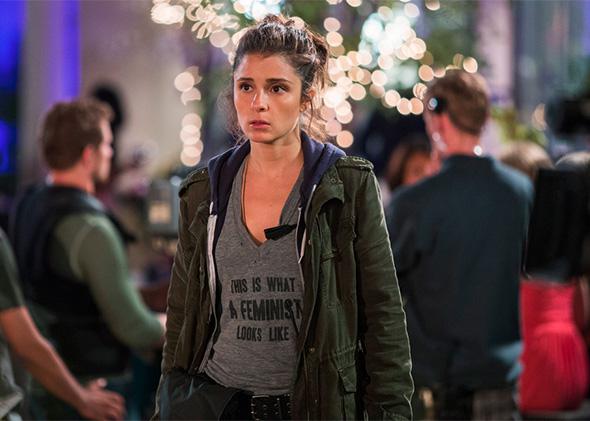A series started earlier this summer about a tortured antihero operating in a corrupt world of immense psychic violence. Before you shout, “I have seen that one before! And before and before” let me stop you: You have not. Lifetime’s UnReal is a scripted drama set behind the scenes of a reality show closely modeled on The Bachelor—a setting that immediately suggests the show will be a bit of frivolous summer fun, a spoof, a lark, a guilty pleasure. But UnReal is darker than a locked box inside a lightproof cube sitting on the bottom of the ocean at midnight. It is an ice cream sundae laced with ipecac, delectable and poisonous all at once.
UnReal stars Shiri Appleby as Rachel Goldberg, a producer of a long-running Bachelor-esque franchise called Everlasting. When we first meet her, she is wearing a “This Is What A Feminist Looks Like” T-shirt, but she has forsaken almost all of her principles, feminist and otherwise. As UnReal begins, Rachel has just returned to Everlasting after an on-camera breakdown in which she described the show as “Satan’s asshole,” a bit of honesty that inadvertently scored great ratings, but put her in financial debt to the franchise. She is welcomed back, with a bit of blackmail in the air, by the show’s fierce executive producer Quinn King (Constance Zimmer), who knows that Rachel is an ace. “People like and trust [Rachel],” Quinn says in the pilot, “and that can’t be taught.” Appleby, who has never been so good before, makes the audience like and trust her too, even as she begrudgingly does wrong after wrong: We are all Rachel’s marks.
Rachel is a remarkable empath, and with this great power she has forsaken responsibility, allowing herself to get off on the short term high of being good at her job, even if that job is morally repugnant and doing it so well is self-destructive. Over the first half of the season, Rachel has rewarded Quinn’s faith in her, at the expense of kindness and decency. Rachel always seems to want to do the right thing—to not sell out, expose, manipulate, and embarrass the women on Everlasting for good television—but not quite enough to, in fact, do the right thing. (Monday night’s episode, the season’s fifth, is the first in which Rachel’s good intentions don’t come to naught.)
UnReal was co-created by Marti Noxon and Sarah Gertrude Shapiro; Shapiro worked for a time as a producer on The Bachelor. That franchise is hardly a paragon of decency, but—as all those texts you send while watching can attest—it can be boring and dull. Everlasting, in contrast, is never either, thanks largely to Quinn, who uses her killer instinct and the promises of bonuses to egg her producers on. So much of The Bachelor is taken up discussing “connections” and going on cheesy group dates, but on Everlasting, Rachel and the other producers have elicited on-screen meltdowns by suggesting to a former foster child she is unlovable, refusing to tell another that her father is seriously ill, encouraging a black contestant to act the part of the “black bitch,” enabling bulimia, and swapping out a woman’s anti-psychotics. UnReal pays reality TV watchers the compliment of presuming that they need more entertainment to be entertained—and then backhands it by supplying entertainment only a sadist could, in good conscience, enjoy.
But even as UnReal gooses the depravity of a show like The Bachelor for effect, it can’t squash its stickiness. UnReal presents reality TV as a mentally gladiatorial sport, where—for the most part—women fight women to the point of breakdown: Rachel and Quinn may be behind the scenes, but they are also women on the verge.
And even this bleak perspective on the genre is buoyed by the genre. Reality TV is shiny, loopy, and fun, and it retains some of these qualities even when it is being excoriated as a hideous machine that threshes smart and decent people in its maw. It has always been, to a certain degree, insult-proof—critiques don’t make it any less fascinating. If reality TV is a sea full of toxic waste, visiting it is still a day at the beach.
UnReal skirts the mistakes that so many antihero copycat shows have made, not by forsaking the antihero or his attendant themes, but by putting them in a new, generative setting: one concerned with women. (Imagine True Detective set among, say, sister wives; I’d watch.) UnReal, a series created by women and largely starring women, eviscerates a format that mostly features women, and airs on Lifetime, a network for women. UnReal’s themes are so somber—cruelty, apathy, self-abasement, perversion of talent, bread and circuses—it would seem to be a more natural fit for a corrupt police office, some seedy underworld, even a women’s prison. But setting UnReal somewhere so obviously bleak would be the wreck of it. The play of darkness and darkness that registers as light is what makes the show so watchable: it’s the TV equivalent of the dress. Figuring out if it’s black and blue or something lighter is all the fun.
